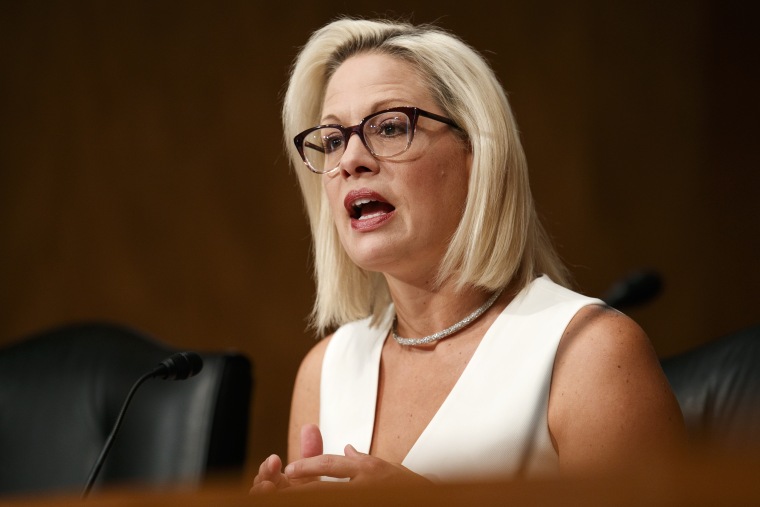When it comes to efforts to reform the Senate's filibuster rules, proponents of institutional changes clearly have plenty of momentum. Many senators who, as recently as a few years ago, wanted to leave the chamber's status quo in place indefinitely have changed their minds.
But in the Senate Democratic conference, support for an overhaul is not yet universal. Sen. Joe Manchin (D-W.Va.) receives the bulk of the attention in this debate, in part because he's Congress' most conservative Democrat, and in part because he's been quite vocal in his opposition to major institutional changes.
Sen. Kyrsten Sinema (D-Ariz.), however, is every bit as opposed to filibuster reforms as Manchin -- and by some measures, more so. She just tends not to talk about it as much.
In early March, the Arizonan wrote a relatively long letter to a constituent, making the case for leaving the filibuster alone. It was good to see the senator tackle the issue in some detail, but Sinema's letter included suspect historical claims.
This week, the Democratic senator elaborated on her perspective to the Wall Street Journal.
"When you have a place that's broken and not working, and many would say that's the Senate today, I don't think the solution is to erode the rules," she said in an interview after two constituent events in Phoenix. "I think the solution is for senators to change their behavior and begin to work together, which is what the country wants us to do."
I read this paragraph several times, trying to better understand where Sinema is coming from, but it's a difficult perspective to understand.
To be sure, it's encouraging to see the senator acknowledge concerns that the Senate is "broken" and "not working." After all, the status quo is awfully tough to defend. But by all appearances, it's the abuse of the rules that has turned the chamber into such a mess. Restoring the Senate to a majority-rule institution -- the way it operated for generations before the routinization of abuses -- would allow it to start functioning again, but that's a change Sinema will not consider.
To restore majority-rule, she says, would be to "erode the rules" that are being abused.
But it's that next sentence in her quote that I found especially important: "I think the solution is for senators to change their behavior and begin to work together."
Wouldn't it be great if it were that simple?
Senate Republicans have broken the institution, refuse to compromise, and have abandoned any interest in responsible governance? This could be fixed if GOP senators simply "changed their behavior."
And while I can appreciate the appeal of such a wish -- I'd be delighted if Senate Republicans behaved more responsibly -- there's an unavoidable follow-up question: what if senators don't "change their behavior and begin to work together"?
What if Americans elect a Democratic House, Democratic Senate, and Democratic White House, expecting elected officials to deliver on a Democratic agenda, and Republicans stand in the way of constructive policymaking? What if GOP senators are asked to "change their behavior," and they respond, "No"?
Sinema appears to believe that, at that point, the nation should simply tolerate a Senate that is "broken" and "not working," leaving it intact until voters elect members who'll behave more responsibly. Given the ideological direction of the Republican Party, that's a recipe for indefinite dysfunction.

